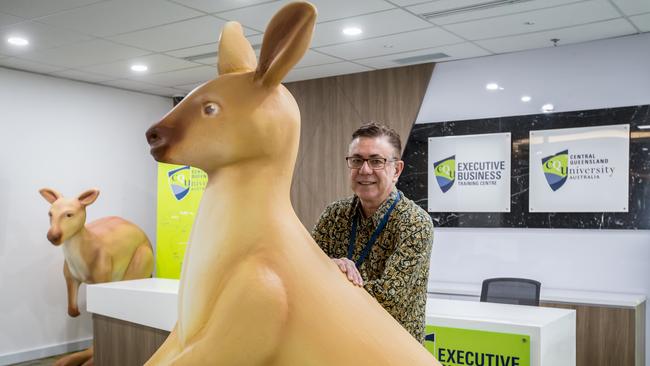Central Queensland University opens a new campus in Indonesia
Central Queensland University quietly opened the first Australian university campus in Indonesia this week, despite the coronavirus.

When Indonesian President Joko Widodo visited Australia last month to ratify the landmark free-trade deal, a key announcement was the green light for Monash University to set up the first 100 per cent foreign-owned university campus in Indonesia.
Yet it was Central Queensland University which quietly opened the first ever Australian university campus in Indonesia this week, offering initial MBA courses in e-commerce, data science and Islamic banking from July.
Australia’s largest regional university has been working for three years on building a physical presence in Indonesia, and it has finally done so in partnership with a private Indonesian operator called Bakrie University.
The result is an impressive 18th-floor campus — replete with kitsch, Jurassic-sized fibreglass kangaroos and koalas — in an office building in south Jakarta’s embassy and business district.
The genesis from idea to launch was not without obstacles — not least of which has been the current coronavirus pandemic that forced the university to significantly downscale its launch this week and shift its first MBA intake from this month to July.
But the university is rolling with the punches and will begin its first executive training courses next month.
“We did a lot of research on demand and had a lot of conversations with government and ministries to find out what their aspirations were,” CQU senior deputy vice-chancellor Alastair Dawson told The Australian.
“The thing we have heard consistently over the past few years is that Indonesia recognises it has to improve the quality of its education, that they’re growing at a rapid rate and need to expand access to higher education.’’
Under the partnership, Bakrie will teach the first four semester subjects and CQU the remainder.
All students must pass Australian-standard entry requirements, including English language proficiency, and the lecturers will be largely foreign-trained.
The CQU Indonesia campus can currently accommodate up to 300 students — and has options to expand to the floors directly above and below it — and includes what its academic director James Bartle said was the country’s first digital lecture theatre. The university also hopes to expand its online learning in coming years as part of its commitment to help the Indonesian government broaden higher education access for its bulging youth population across the sprawling archipelago nation.
“It’s not currently part of the education culture in Indonesia but technology is moving at such a rapid pace that it’s offering great opportunities to deliver quality education that is as good as face-to-face, and part of that expansion is convincing government to recognise that,” Dr Bartle said.
Indonesia’s underfunded and low-ranking higher education sector has long been ripe for foreign investment, though universities seeking a foothold in the country have until now been stymied by its prohibitive investment climate and so-called “negative investment list”.
Mr Jokowi’s avowed second-term priority to build human capital has led to some relaxation of those restrictions, including allowing foreign universities to open up in designated special economic zones. But the Indonesia-Australia Comprehensive Economic Partnership Agreement presents Australia’s tertiary sector with a unique advantage by easing even those conditions for establishing majority-owned Australian institutions in Indonesia.
Not everyone has welcomed the move. Indonesia’s private university sector argues that opening the industry to foreign-owned campuses unfairly disadvantages it because it must compete with foreign campuses for the middle-class student market.
But the deputy chairwoman of Indonesia’s Chamber of Commerce and Industry, Shinta Kamdani, insists foreign competition can only benefit Indonesia by providing students who cannot afford to study overseas with “world-class education” at home. “There is room for all parties to benefit from this, Indonesian public and private universities, as well as Australian universities,” she said.
Monash University is the first to do so from the IA-CEPA deal, though CQU says it has not ruled out the possibility it too may shift to a 100 per cent Australian-owned model. But Professor Dawson insists that will not spell the end of its partnerships, either with Bakrie University in Jakarta, or in North Sulawesi and Bali, where CQU has entered into joint agricultural research projects with both the Indonesian and provincial governments.




To join the conversation, please log in. Don't have an account? Register
Join the conversation, you are commenting as Logout